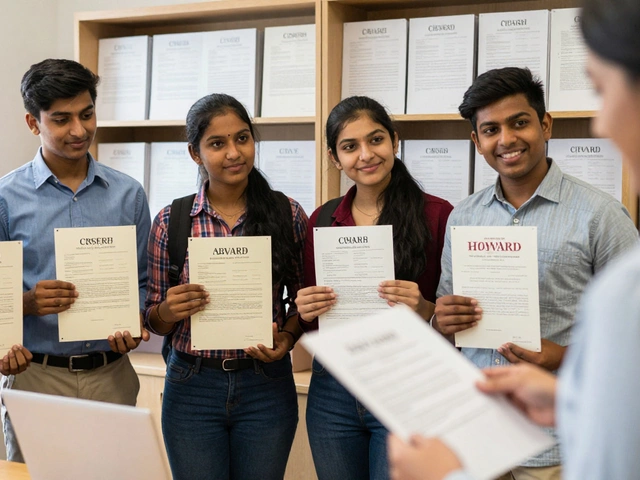Most folks look at government jobs and think, “Secure job, steady salary, decent life.” But here’s what surprises a lot of people: there are a few government services where the salary easily competes with top private sector gigs. Getting into these roles is tough, but the pay, perks, and respect are on a whole different level.
If you’re focusing on government job prep, you need to know right away which services offer the best paychecks. Don’t just rely on hearsay or old charts—salaries and perks change as the economy, government budgets, and policies shift. For 2025, certain government jobs clearly lead the pack in terms of take-home pay and benefits.
This isn’t just about the base salary. Think about all the extras: government accommodation, official cars, travel allowances, and sometimes even free utilities. In some high-profile positions, your total package can blow private sector offers out of the water, especially when you count job security and pension.
A lot of students shoot for IAS or IPS thinking they're the top dogs. But did you know specialists in PSUs, RBI Grade B officers, or engineers at ISRO often take home more, all things considered? The competition is fierce, so you need to prep smart and keep your options open.
- Top Highest-Paying Government Services
- Perks That Push Government Pay Higher
- Why Some Government Jobs Pay More
- Tips to Crack High-Salary Government Exams
- What to Weigh Besides Salary
Top Highest-Paying Government Services
When people think of government jobs with the best pay, most imagine IAS or IPS officers at the front of the line. But if you actually compare salary packages, some lesser-known services come out ahead—especially when you count all the perks and bonuses.
Let's rank the most lucrative government services as of 2025, based on monthly in-hand salary, allowances, and the overall number of people appointed each year. Some roles hand out fat bonuses and performance-based pay, so look beyond the basics.
| Service | Approx Monthly Salary (₹) | Popular Perks | Recruitment Through |
|---|---|---|---|
| Public Sector Undertaking (PSU) Executives | 1,20,000 – 2,40,000 | HRA, car, annual bonuses | GATE, internal exams |
| Indian Administrative Service (IAS) | 96,000 – 2,00,000 | House, staff, travel, power | UPSC Civil Services Exam |
| RBI Grade B Officers | 1,10,000 – 1,35,000 | Rent-free flat, education, LTC | RBI Grade B Exam |
| Indian Foreign Service (IFS) | 97,000 – 2,00,000 | Foreign posting, dollars, elite status | UPSC Civil Services Exam |
| Defence Services (Armed Forces Officers) | 85,000 – 2,00,000 | Free housing, canteen, service pay | NDA, CDS, technical entries |
| ISRO/DRDO Scientists | 90,000 – 1,40,000 | Housing, research grants | Campus placements, direct |
If you care only about the number, PSU jobs often lead. OIL, ONGC, NTPC, and GAIL offer executive posts where your in-hand salary can hit ₹2.4 lakh per month after a few years—side gigs like official cars, bonuses, and low-cost loans add up fast.
For prestige, government jobs like IAS and IFS still score big, especially once you reach senior ranks. In foreign postings, IFS officers get paid in dollars plus special perks like international schooling for kids. RBI Grade B officers enjoy city postings, hands-off political interference, and solid work-life balance—something aspirants really value these days.
If you're a science or engineering geek, ISRO and DRDO scientist roles let you work on cutting-edge stuff and still earn more than most state bureaucrats, with all the security the government can offer. Defence services are another strong option—thanks to tons of allowances and a robust pension system, salaries go much higher at higher ranks.
The bottom line: there’s no single winner across the board. If you want the highest pure take-home pay, PSUs are usually king. If you also want power, prestige, or international exposure, IAS, IFS, or RBI posts are heavy hitters. Weigh your goals with the facts before you start your prep.
Perks That Push Government Pay Higher
When people talk about high-paying government jobs, they often miss something important—the real magic comes from the perks, not just the direct salary. These extra benefits can seriously bump up your yearly take-home value and beat out many private sector offers.
In India, top government services like IAS, IPS, RBI, and officers in PSUs (like ONGC, BHEL, and GAIL) load up on extras. It's not just the pay slip; you get things like:
- Government jobs like IAS and RBI give you rent-free or highly subsidized accommodation, often in prime locations.
- Free electricity, water, telephone, and sometimes even gas in official homes.
- Official vehicles with a driver. For senior roles, this can mean a car, fuel, and maintenance, all covered.
- Medical facilities for you and your family, not just at government hospitals but top private ones too.
- Leave Travel Concession (LTC) or paid holidays with family within and sometimes outside India.
- Exclusive memberships in clubs and use of guesthouses across the country.
- Interest-free or low-interest loans for vehicles or housing.
- Pension after retirement and job security most private jobs can't match.
Here's a head-turner: An IAS officer posted in Delhi gets a subsidized bungalow in areas where regular rentals can be over ₹2 lakh a month. That's a massive chunk of savings right there.
Want to see how these perks stack up? Check this comparison for 2025:
| Government Service | Accommodation | Car Allowance | Medical Cover | Pension/Benefit |
|---|---|---|---|---|
| IAS/IPS Officers | Free/Super low rent in top areas | Yes, official car with driver | Full, family included | Lifetime pension |
| RBI Grade B | Up to ₹70,000/month HRA | Travel allowance, car loan | Full reimbursement | Pension and medical post-retirement |
| PSU Executives (e.g., ONGC) | Company-leased flat or house | Car lease, fuel paid | Full, private hospital tie-ups | Superannuation benefits |
All these add up to a real-world salary package that goes way beyond what the pay slip shows. If you're aiming high, remember—it’s these little-big extras that make all the difference.

Why Some Government Jobs Pay More
Ever wonder why a few government jobs almost feel like lottery wins, while others just cover the basics? It usually comes down to the level of responsibility, the skills needed, and how much the government wants to attract top talent to certain sectors.
Let’s break it down:
- Skill Shortages and Specialization: Positions like scientists at ISRO, engineers in top PSUs, or RBI Grade B officers need specialized degrees and skills. The government needs to compete with private sector offers, so they bump up pay and bonuses to keep these folks from leaving.
- Sensitive Roles: Jobs with access to critical data, like intelligence agencies or RBI, pay well because mistakes or leaks here can cost the country big time. Trust and skills deserve a solid reward.
- Remote or Tough Postings: Ever heard of extra allowances for working in the North East, Andaman, or high-security zones? These jobs are tough, and the government gives bigger pay packages to encourage folks to sign up.
- Leadership and Responsibility: Civil services like IAS, IFS, and IPS come with huge decision-making power. You’re running districts, managing billions, and keeping law and order. The money reflects the stakes and stress involved.
- Industry Competition: Some government jobs (like top PSU jobs) compete with MNCs for the same talent. So, their compensation is loaded with performance-based incentives, shares, or bonuses, apart from great base salaries.
At the end of the day, the government knows that you can’t run high-stakes or super-specialized departments on goodwill alone. When the job demands 24x7 commitment or niche expertise, the pay goes up fast. If you’re gunning for these roles, remember it’s not just about clearing an exam—it’s about proving you can handle what comes next.
Tips to Crack High-Salary Government Exams
Want to land a government jobs role with a fat paycheck? It’s no walk in the park, but if you get strategic, you can crack it. The top-paying exams like UPSC, RBI Grade B, and PSU recruitment have tough competition, so you need a plan that’s sharper than just reading textbooks.
Start with checking the actual exam pattern. For example, UPSC CSE tests you across General Studies, aptitude, and a specific subject, while PSU technical exams dive deep into engineering questions. RBI Grade B has General Awareness, English, and Finance sections. So, don’t spread yourself thin—target the subjects that matter most for your specific exam.
- Make a timetable and track your progress weekly. Most toppers swear by daily study targets.
- Use the official syllabus and past year papers—analysis shows 40-60% of questions in high-salary government exams repeat topics or concepts from previous years.
- Mock tests are your best friend. A study by IndiaBix in 2024 showed candidates who did 20+ mocks scored 12% higher on average in government job exams.
- Keep notes short. Summarize current affairs monthly; don’t get lost in newspaper archives!
- For interviews (personality tests), practice with friends or mentors. Panel interviews might seem intimidating, but three or four solid rehearsals can change how you perform.
Here’s a quick look at the selection stages and their weightage for popular high-paying government exams in India:
| Exam | Key Stages | Weightage (Approx.) |
|---|---|---|
| UPSC Civil Services | Prelims, Mains, Interview | Prelims (Qualifying), Mains (75%), Interview (25%) |
| RBI Grade B Officer | Prelims, Mains, Interview | Prelims (Qualifying), Mains (80%), Interview (20%) |
| PSU Engineer (via GATE) | GATE Score, Group Discussion, Interview | GATE (85%), GD/Interview (15%) |
Lastly, don’t burn out. Allot a day each week to relax, exercise, or chill with friends, because a tired mind is just not going to hack these tough exams. If you slip one week, adjust your timetable and get back on track. Persistence beats luck every single time.

What to Weigh Besides Salary
Chasing the top government jobs for their pay is smart, but it’s not the whole story. Some roles sound awesome on paper, but the real experience can be hit or miss depending on your preferences and long-term goals.
First, think about work-life balance. Jobs like IAS and IPS offer big perks but often demand brutal work hours, emergencies, and transfers anywhere in the country. On the flip side, PSU jobs (like NTPC or ONGC) may offer more regular schedules and predictable postings, which actually matters if you value family time or want to stay in one city for a while.
Pension and post-retirement benefits are a big deal. Central government jobs usually have the National Pension Scheme (NPS), but older jobs recruited before 2004 get a guaranteed pension—hugely valuable as you get older. Some PSUs even top up your retirement corpus with extra benefits.
Working environment can make or break your happiness. Technical jobs like those at ISRO, DRDO, or RBI feel very different from admin-heavy posts in state services. If you like solving technical problems, those roles might keep you motivated for years, while administrative jobs require people skills and dealing with lots of bureaucracy.
There’s also promotion speed and career growth. Civil services can take ages for your first big promotion, while PSU or banking jobs sometimes let you climb up faster if you clear internal exams and perform well.
- Location: Is transfer every couple of years okay for you? Or do you crave stability?
- Job Risk: Police and defense roles pay well but come with risk. Consider your comfort zone.
- Growth Opportunities: Some jobs offer specialized training, foreign postings, or study leaves—great for career upgrades.
If you only focus on cash, you could land a cushy paycheck but burn out or get stuck somewhere you don’t fit. Weigh all these angles before locking in your target service. Salary opens doors, but day-to-day life and long-term security matter, too.




